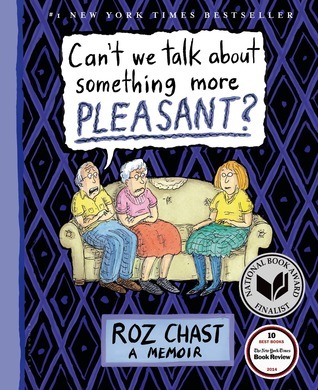Review of "Can't We Talk About Something More Pleasant?" on 'Goodreads'
5 stars
(Crossposted from my blog: daariga.wordpress.com/2015/07/12/cant-we-talk-about-something-more-pleasant/)
In today’s society and media, there are still many topics that are taboo, with death being at the top of that list. The picture given of the years before death and death itself is totally misleading. A pretty image is painted of jolly old people with silver hair, weaker in strength, but fit in mind and spirit. And then they, presumably, need some hospitalization a few times and pass away peacefully in bed. It always irked me that this was not what I personally experienced with my grandparents, all of whom lived beyond 85-90 years. What I saw was totally different: a steady deterioration of the mind and body, senile dementia combined with most embarrassing of all: loss of bowel control. I witnessed how a person who was a rock in your life can turn out to completely stress and depress their loved ones in their last throes.
Though quite depressing to read, it is such experiences of her parents’ last years that Roz Chast has captured in the form of cartoons in her memoir Can’t We Talk About Something More Pleasant? She uses her trademark humor to lighten the mood, but there is only so much you can do when your parent is slowly losing all mental faculty. This is a great book, coming especially from an Occidental author, where these travails are hidden as much as possible.
We start off from the time her parents are living independently in their Brooklyn flat, where they have lived all their life. To be honest the first half of the book is quite cheery, filled with the oddities you will notice about your parents once you turn into an adult. After requiring a few hospitalizations, the first in their lives, it is obvious that her parents are in their last years. Though losing their memory, old people can be quite obstinate about changes and lots of these situations stress out the author. As things worsen, they finally agree to move out of their flat to a home for the aged. As health further worsens, comes inability to move around, adult diapers, liquid food and finally palliative care. In the end, the last words of a mind that is switching off is ironically the first it ever uttered: calls to a mother or a father.

